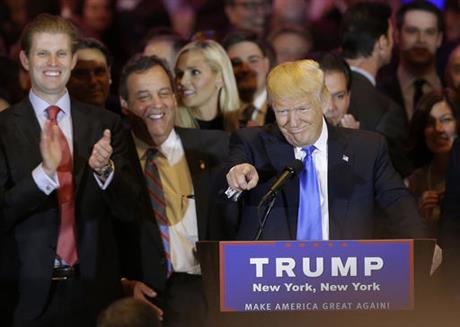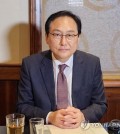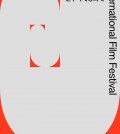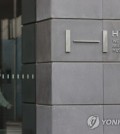- California Assembly OKs highest minimum wage in nation
- S. Korea unveils first graphic cigarette warnings
- US joins with South Korea, Japan in bid to deter North Korea
- LPGA golfer Chun In-gee finally back in action
- S. Korea won’t be top seed in final World Cup qualification round
- US men’s soccer misses 2nd straight Olympics
- US back on track in qualifying with 4-0 win over Guatemala
- High-intensity workout injuries spawn cottage industry
- CDC expands range of Zika mosquitoes into parts of Northeast
- Who knew? ‘The Walking Dead’ is helping families connect
Trump’s big speech tests his foreign policy and style

Republican presidential candidate Donald Trump speaks during a primary night press conference, Tuesday, April 26, 2016, in New York.
WASHINGTON (AP) — Donald Trump’s highly anticipated foreign policy speech Wednesday will test whether the Republican presidential front-runner, known for his raucous rallies and eyebrow-raising statements, can present a more presidential persona as he works to unite the GOP establishment behind him.
Trump is expected to outline a vision for U.S. foreign policy that focuses on rebuilding alliances, charting a new course with Russia and Iran and tackling the threat posed by the Islamic State, according to Walid Phares, one of the Republican front-runner’s foreign policy advisers. Phares said Trump would be outlining his views broadly, adding “There will be no details in this speech.”
Of Trump’s plans for combatting the Islamic States specifically, Phares said, “He’s not going to say ‘we’re going to send three brigades to do the job.’ No. He’s going to confirm the principle that ISIS should be destroyed so that the other political settlements can work.”
As much as the content will be scrutinized, so, too, will Trump’s ability to deliver his message in a way that comes off as both presidential and authentic to himself.
“This is all part of the normalization effort, or the mainstreaming of Donald Trump,” said Lanhee Chen, who served as 2012 GOP nominee Mitt Romney’s chief policy adviser and advised Marco Rubio’s campaign before the Florida senator dropped out.
Trump has a lot to prove when it comes to calming foreign leaders and policy professionals. They’ve been stunned by his often brash policy proclamations, like his vow to temporarily bar foreign Muslims from entering the country, and an apparent disregard for some long-standing alliances. Those concerns were amplified when Trump introduced a foreign policy team last month that left many scratching their heads.
Phares said that team is growing, and suggested that more favorable views of Trump’s foreign policy philosophy would come along with that.
“The speeches are speeches, politics are politics, and primaries are primaries,” he said. “And then this is a speech on national security that would be one that he would deliver if he is elected. So that’s going to be a different outlook.”
Already, Democratic front-runner Hillary Clinton’s campaign is trying to ensure that voters don’t forget about Trump’s previous statements. Her team blasted out a news release saying Trump has used “the most reckless rhetoric of any major presidential candidate in modern history.”
Trump’s speech is expected to be dressed with the trappings of gravitas. It will be held at Washington’s stately Mayflower Hotel (after a last-minute location change blamed on “overwhelming interest”) and will be presided over by Zalmay Khalilzad, a former U.S. ambassador to Afghanistan and Iraq, according to the campaign. Trump is expected to use a teleprompter, despite the fact that he has mocked his rivals for doing the same, declaring at one point: “If you’re running for president you shouldn’t be allowed to use a teleprompter.”
The speech comes as Trump has been working to professionalize his campaign with the addition of several new and experienced aides who have stressed a need to expand his policy shop and offer more specifics on his plans.
“Tomorrow’s going to be, I think, interesting,” Trump told reporters Tuesday night. “It’s going to be some of my views on foreign policy and defense and lots of other things, and part of it is economics.”
He added, however, that he would not be laying out a “Trump doctrine,” saying that “in life you have flexibility, you have to change.”
Senior aide Paul Manafort said last week that he’d met people at a number of think tanks and members of Congress to talk about bulking up the team’s policy component, which is smaller than that of leading campaigns in the past.
“We’re finding there’s a lot of interest in working with him, coming on board,” he told reporters.
Manafort spent about an hour at the Heritage Foundation headquarters in Washington last week meeting policy experts at the conservative think tank. Heritage officials cast the meeting as part of a series of briefings for candidates and their advisers.
While Trump’s speech marks a departure from his usual rally routine of speaking off the cuff, consulting only hand-scrawled notes, his remarks in front of the American Israel Public Affairs Committee last month provided a test run of sorts, with Trump speaking from a prepared speech using a teleprompter.
While Trump largely stuck to his speech as he declared his support for Israel and railed against the Iran nuclear deal, he veered off-script when referring to President Barack Obama’s last year in office.
“Yay,” Trump said, drawing cheers. “He may be the worst thing to ever happen to Israel, believe me.”
The asides prompted an unprecedented apology from the group’s president the next day, saying the committee took “great offense” to criticism of the president from its stage.











